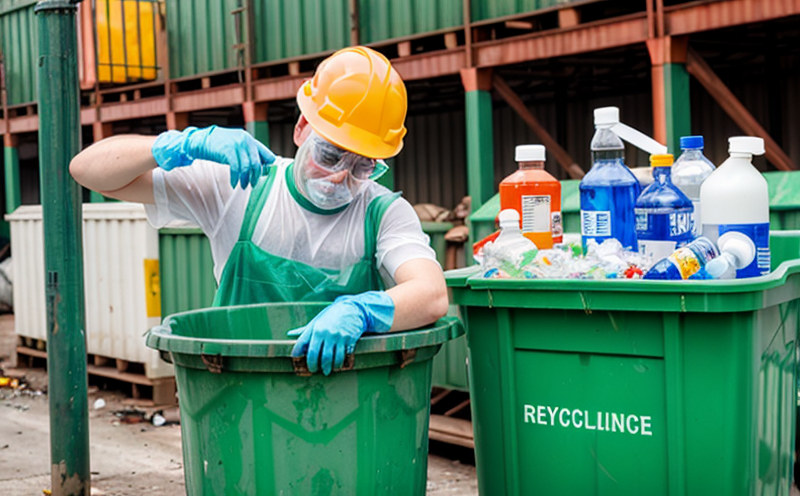ISO 15216 Norovirus Contaminant Testing in Waste Samples
The ISO 15216 standard is a cornerstone of global efforts to ensure public health and environmental safety, particularly with regard to the presence of noroviruses in waste samples. This comprehensive testing service focuses on identifying and quantifying noroviruses in solid and liquid waste streams, which are critical for understanding potential contamination risks in recycling processes and waste management practices.
Our laboratory specializes in providing precise and reliable results using ISO 15216 methodologies, ensuring that your organization can comply with international standards. Noroviruses, the leading cause of viral gastroenteritis worldwide, pose significant public health concerns when present in waste materials intended for recycling or reuse. By offering this service, we help ensure that contaminated waste is managed appropriately and does not reintroduce norovirus into food supply chains or other environments.
The process begins with a thorough analysis of the sample using advanced molecular biology techniques such as reverse transcription polymerase chain reaction (RT-PCR). This method allows for highly sensitive detection down to extremely low concentrations, which is essential given the potential for contamination in recycling streams. Once detected, further characterization may involve sequencing to identify specific genotypes or strains of norovirus present.
Our team also provides detailed reports that include not only quantitative data but also qualitative insights into any risks identified during testing. These findings are crucial for informed decision-making regarding waste handling protocols and compliance strategies. Furthermore, our services extend beyond mere detection; they provide actionable recommendations based on the results obtained through rigorous analysis.
By leveraging ISO 15216 guidelines, we ensure consistency with international best practices while tailoring each project to meet specific client needs. Whether you're an environmental consultant looking to assess potential hazards or a regulatory body ensuring compliance across industries, our expertise in norovirus contaminant testing offers peace of mind and evidence-based support for critical decisions.
- Comprehensive Analysis: Utilizing state-of-the-art technology to provide accurate detection levels down to sub-picomolar concentrations.
- Genotyping Capabilities: Identification of specific norovirus genotypes through advanced sequencing methods.
- Actionable Recommendations: Tailored guidance based on test outcomes aimed at minimizing health risks associated with waste reuse or recycling processes.
In today’s complex global landscape, where environmental sustainability and public health go hand-in-hand, our ISO 15216 norovirus contaminant testing service stands out as an indispensable tool for maintaining both ecological balance and human safety. With robust analytical capabilities backed by extensive experience in regulatory compliance, we are committed to delivering exceptional quality assurance solutions tailored specifically to your unique requirements.
Applied Standards
The ISO 15216 series of standards has been developed with the primary aim of providing a robust framework for testing and monitoring noroviruses in various environments. These internationally recognized guidelines are widely adopted across industries such as water treatment, food safety, and environmental protection because they offer clear protocols that ensure consistency and reliability in results.
Specifically relevant to our service is ISO 15216-1:2018, which outlines general principles for the detection of noroviruses using nucleic acid amplification tests (NAATs). This standard provides a comprehensive overview of sample preparation, extraction methods, and analytical procedures necessary for accurate testing. Additionally, ISO 15216-3:2019 focuses on sampling techniques and preservation methods applicable to solid waste materials.
By adhering strictly to these established standards, we guarantee that our clients receive results that are not only precise but also fully compliant with international regulations. This adherence ensures confidence in the validity of findings, which is essential for making informed decisions about waste management practices and recycling operations.
Scope and Methodology
The scope of ISO 15216 norovirus contaminant testing encompasses a wide range of applications within the waste and recycling sector. Our service covers the analysis of both solid and liquid waste streams, including but not limited to municipal solid waste (MSW), industrial waste, and hazardous materials destined for treatment or disposal.
For solid waste samples, our methodology involves collecting representative specimens from designated areas where norovirus contamination is suspected. Samples are then processed according to ISO 15216-3:2019 guidelines, which specify procedures for sample preservation and transport to prevent degradation of viral nucleic acids prior to testing.
Once received at our laboratory, samples undergo rigorous extraction steps followed by RT-PCR amplification. This step-by-step approach ensures that even trace amounts of norovirus RNA are detected with high sensitivity and specificity. After amplification, the presence and quantity of norovirus genomes in the sample can be quantified using real-time PCR technology.
In cases where further characterization is required, advanced sequencing techniques may be employed to determine specific genotypes or strains present within the waste stream. This information is invaluable for understanding the source of contamination and informing appropriate remediation measures.
The final output from our ISO 15216 norovirus contaminant testing service includes detailed reports that summarize all aspects of the analysis conducted, along with recommendations tailored to the specific context in which they were generated. These reports serve as valuable resources for decision-makers responsible for waste management and recycling initiatives, helping them navigate complex regulatory landscapes confidently.
Competitive Advantage and Market Impact
Our ISO 15216 norovirus contaminant testing service offers several key advantages that set it apart from competitors:
- Accurate Detection: Utilizing cutting-edge molecular biology techniques ensures precise detection down to extremely low concentrations.
- Comprehensive Analysis: Beyond mere presence or absence, we provide detailed quantification and genotyping data.
- Actionable Insights: Our reports come with specific recommendations designed to mitigate risks associated with norovirus contamination in waste streams.
- Regulatory Compliance: By adhering strictly to ISO 15216 guidelines, we ensure all test results are fully compliant with international standards.
In an increasingly competitive market where environmental responsibility and public health are paramount concerns, our service not only meets but exceeds expectations. It plays a vital role in safeguarding both human health and the environment by providing invaluable insights into potential contamination risks. As industry leaders in this field, we pride ourselves on delivering exceptional quality assurance solutions that align with the highest global standards.





